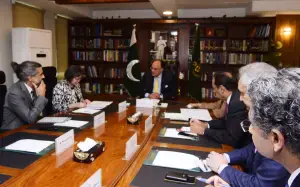IMF sets over 11 new reform benchmarks under $7b bailout for Pakistan
3 min readThe International Monetary Fund (IMF) has introduced 11 new structural benchmarks (SBs) under its $7 billion Extended Fund Facility (EFF) for Pakistan, signaling a continued push for broad-based economic reforms across fiscal, governance, social, energy, financial, and trade sectors.
In its latest review report titled “First Review under the Extended Fund Facility (EFF) Arrangement, Requests for Modification of Performance Criteria, and Request for an Arrangement under the Resilience and Sustainable Facility (RSF)”, the IMF emphasized that these new commitments are vital to maintaining economic stability and meeting program targets.
Fiscal Reforms:
Two major fiscal benchmarks include the parliamentary approval of the FY2026 budget, in line with IMF staff-level agreements, by end-June 2025, and the implementation of new Agriculture Income Tax laws.
The latter involves establishing infrastructure for return processing, taxpayer registration, communication efforts, and compliance enforcement.
Governance and Social Protection:
By October 2025, authorities are required to publish a governance reform action plan, based on the IMF’s Governance Diagnostic Assessment.
Additionally, the Kafaalat cash transfer programme must undergo an annual inflation adjustment by January 2026 to preserve the purchasing power of its beneficiaries.
Financial and Monetary Policy:
The government will develop and release a post-2027 financial sector strategy by June 2026, aimed at reinforcing regulatory and institutional stability from 2028 onward.
Energy Sector Overhaul:
The IMF has set several critical benchmarks in the energy sector, including:
-
Tariff rebasing notifications for electricity and gas by July 1, 2025, and a semi-annual gas price adjustment by February 15, 2026, to align tariffs with cost recovery levels.
-
Legislation to make the captive power levy permanent by May 2025, encouraging grid usage and energy efficiency.
-
Removal of the cap on the debt service surcharge through legislation by June 2025, to facilitate circular debt management.
Trade and Investment Reforms:
By December 2025, Pakistan must outline a plan to phase out incentives for Special Technology Zones and other industrial areas by 2035.
Strong Performance on Quantitative Targets:
The IMF report confirmed Pakistan’s compliance with all seven quantitative performance criteria (PCs) for end-December 2024.
These include minimum net international reserves, targeted cash transfers, tax return filings, and limits on budget deficits, government guarantees, and SBP credit.
Pakistan also met most indicative targets (ITs), such as controlling the provincial budget deficit, managing tax refund arrears, reducing power sector dues, and increasing revenue maturity.
However, it fell short on targets for health and education spending, FBR revenue collection, and retailer taxes under the Tajir Dost scheme.
Progress on Structural Benchmarks:
Of the existing structural benchmarks, nine were successfully implemented, including the National Fiscal Pact, reforms in monetary operations, and banking legislation.
Continuous commitments like prohibiting tax amnesties, ensuring parliamentary oversight on unbudgeted expenses, and maintaining currency market discipline were also met.
Some delays occurred in meeting a few targets—such as the provincial agriculture income tax law, which was passed in February 2025 after missing its original deadline.
Legislative changes related to the Civil Servants and Sovereign Wealth Fund Acts were also delayed.
Additionally, SBs concerning undercapitalized banks and captive power producers were missed, although remedial steps are underway.
Read more
IMF approves $1.3 billion tranche for Pakistan despite Indian lobbying efforts
Hence, on May 18, sources revealed that the government prepared a comprehensive plan to raise electricity, gas, and petroleum prices from the beginning of the new fiscal year.
Recently, sources reported that the IMF expressed concerns over the government’s proposal to reduce tax rates for salaried individuals.
Also, they lowered Pakistan’s GDP growth forecast for the outgoing fiscal year 2024-25 to 2.6%, down from its earlier projection of 3.2% in October.
For the latest news, follow us on Twitter @Aaj_Urdu. We are also on Facebook, Instagram and YouTube.

























Comments are closed on this story.